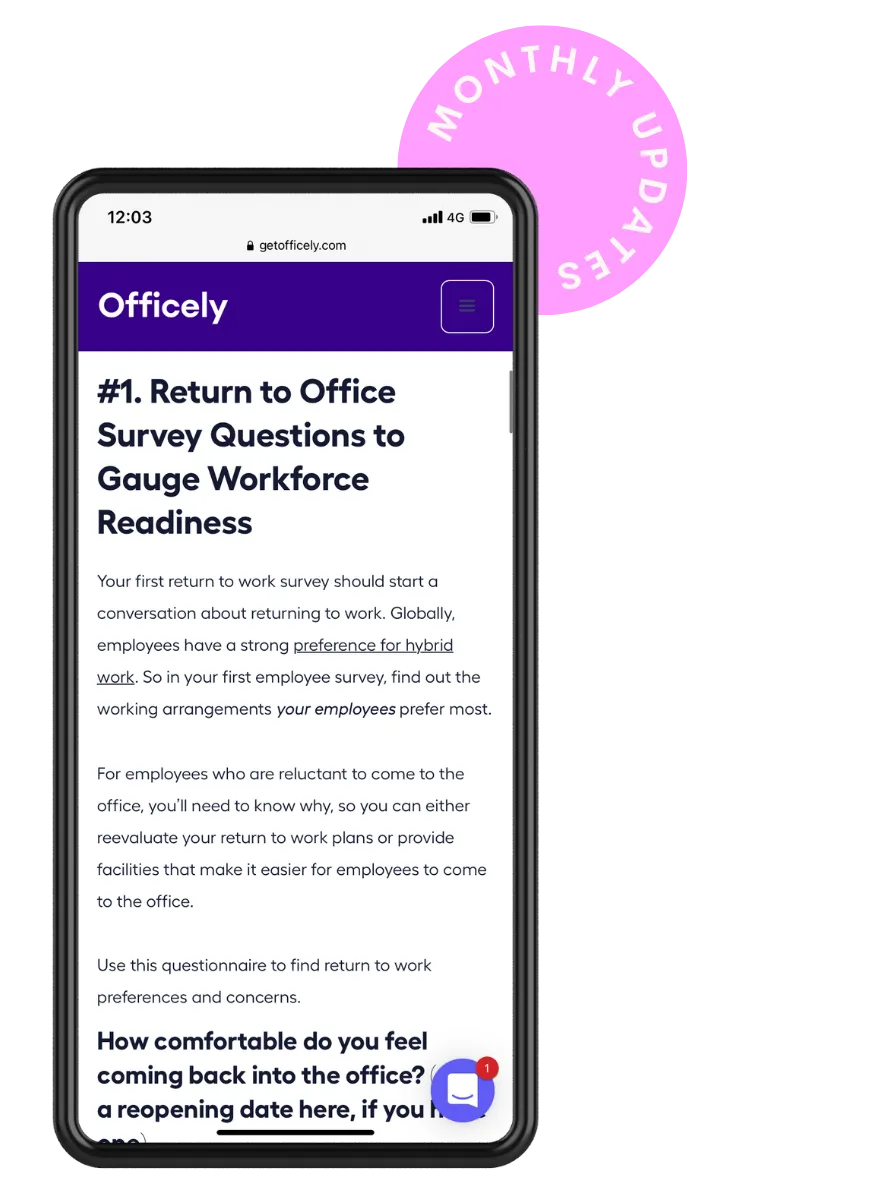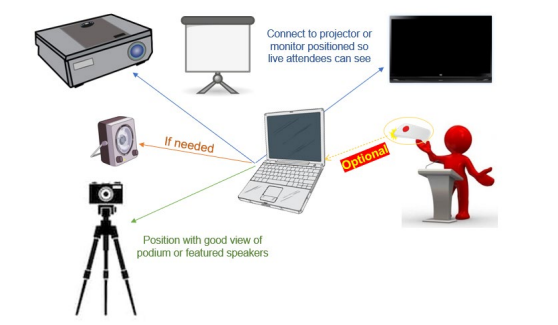Just as you were getting comfortable hosting virtual happy hours, Zoom co-working sessions, and online workshops, office reopenings added yet another possibility: hybrid events.
Truly hybrid events allow both remote and in-office employees to participate in company activities, like social gatherings, team-building games, and educational conferences. But if you’re not careful, your hybrid event can easily feel like yet another Zoom meeting or webinar for remote employees.
While planning hybrid events, weave in enough opportunities for virtual attendees to actively participate and contribute, so their experience is as engaging as that of in-person attendees so they don't feel left out or isolated.
Here are our best tips to transform any office event—like a town hall meeting, yoga session, or even a two-day company retreat—into a fulfilling hybrid event for employees.
Try Officely Today
See who's in the office, organize socials and events, and increase your office attendance all within Slack.

HYBRID OFFICE INSPO STRAIGHT TO YOUR INBOX
Get your monthly hit of insights and ideas sourced by the Officely team.
Join our webinar: How to Encourage Your
Employees Back to the Office
We walk through how you can encourage more of your team
to come back to the office with Officely.
.webp)
Your Essential Hybrid Meeting Technology Checklist
Find the best hybrid meeting technology and equipment to create seamless, inclusive meetings where every participant feels seen, heard, and fully involved.
Try Officely Today
See who's in the office, organize socials and events, and increase your office attendance all within Slack.

HYBRID OFFICE INSPO STRAIGHT TO YOUR INBOX
Get your monthly hit of insights and ideas sourced by the Officely team.
Join our webinar: How to Encourage Your
Employees Back to the Office
We walk through how you can encourage more of your team
to come back to the office with Officely.
New Office Management Handbook for Flexible Workplaces
Packed with actual experts insights and pro tips, this guide is here to help you find out all about managing a flexible office!
Send me the eBook now.webp)
Your Essential Hybrid Meeting Technology Checklist
Find the best hybrid meeting technology and equipment to create seamless, inclusive meetings where every participant feels seen, heard, and fully involved.
5 Tips for Hybrid Events That Engage In-Person and Remote Attendees
An engaging hybrid event is a combination of the right tools, activities, and opportunities for interaction between both in-person and virtual attendees.
Before you get started, it's worth investing in an integration or tool that displays your employees' working location, especially if your team are able to work from a variety of places.
Here are some tips to get each of these right for your hybrid event:
1. Set up tech and tools for audiovisual clarity
For both sets of attendees to share the same event experience, remote participants should be able to see and hear live event activities clearly, while in-person attendees should be able to interact with virtual attendees.
We've discussed the tech setup for hybrid meetings in a previous post. Your hybrid event tech setup might not differ drastically, but it might be more elaborate, depending on the scale of your event.
You'll need meeting or conference software like Zoom or a special hybrid event platform to host your event (more on this below). You'll also need a device like a laptop, tablet, or PC to host the event from your physical venue.
To boost audiovisual clarity for virtual and in-person attendees in a hybrid event, you'll need:
- An extra set of microphones, so virtual attendees can hear in-person participants
- An extra set of speakers, so in-person attendees can hear remote attendees clearly
- Extra cameras for remote attendees to see live activities
- Extra screens for in-person participants to see remote ones

Image source
For smaller events, like a team hangout conducted in a single room, a set of extra speakers, microphones, a screen, and an external camera might do the trick.
For larger events, like a multi-day conference or day-long annual meeting conducted in multiple spaces or rooms, you'll need:
- Multiple cameras to display different audience angles and activities
- External speakers in various locations
- Multiple microphones for in-person speakers
- Large screens to display remote attendees
For large-scale events, consider hiring professional video and audio teams to manage event production if you have the budget.
2. Deliver event swag and food to virtual attendees, too
Event accessories like sweatshirts and food and beverages are the icing on the cake for any event. Deliver these to remote attendees, too, so they can enjoy the complete experience like their in-person counterparts.
Depending on where your employees are based, look for delivery apps such as Grubhub and DoorDash to deliver event goodies to remote employees. Ask remote employees about their food preferences beforehand and plan deliveries accordingly.
As for event swag, think lanyards, company badges, stickers, bags, giveaway prizes, and sweatshirts. Services like Swag.com and Gifts for the Good Life can help you create customized swag boxes for virtual events and also deliver them to your employees.
3. Use a hybrid event platform to host your event
While a tool like Zoom Events might suffice to host a simple hybrid event, consider a more robust platform for large events like a conference.
A hybrid event platform or software acts as a common virtual venue for in-person and virtual attendees to interact with each other. Additionally, such platforms also offer registration for both sets of attendees and analytics features, so you can manage event logistics in one place.
Other features to look for in potential hybrid event platforms include:
- Compatibility with common browsers
- Q&A sessions where attendees can submit questions in advance
- Gamification to add virtual games and challenges to your hybrid event
- Networking sessions or breakout rooms
- Polls
Hybrid event technology is still immature, so beware of tools that promise too much but deliver little. If possible, test the tool or ask for a demo. Check out user reviews on software review sites, too, to get an idea of the tool’s shortcomings.
4. Assign moderators for Q&A sessions and group discussions

Image source
In an event with lots of virtual and in-person attendees, it’s easy for the event host or speaker to miss questions and comments in the virtual chatbox. Moderators can keep a tab on the chat and ensure all virtual attendees’ comments and questions are answered.
Consider assigning two sets of moderators, one in-person and one virtual, to monitor the live chat. Apart from relaying questions and answers to and from virtual attendees, moderators can also:
- Encourage participation in event games
- Attract attention to the leaderboard for event games.
- Help attendees with other queries, like how to access an on-demand video
5. Provide networking opportunities for both sets of attendees
One of the main perks of attending a live event is the ability to interact with speakers, VIPs, and other attendees as you move around the event hall. In a hybrid event, too, you need to facilitate ways for remote and in-person attendees to interact with each other.
Online chat rooms and discussion groups are one way of encouraging interaction, but consider adding more opportunities for one-to-one interaction or smaller group discussions.
One way to offer closer interaction is to set up breakout rooms or video rooms—like those in the event app Socio—so attendees can connect with each other in a small, intimate setting. Attendees can enter a video room based on their interests or location and socialize with others.
.png)
Image source
To make it easy for in-person attendees to access virtual networking rooms, install multiple screens or laptops at the physical venue.
Another option is to host group games like Bingo, escape rooms, or scavenger hunts to help attendees bond. Apps like reElivate can help you organize these in a virtual setting. For instance, for escape room games, the app offers a 360-degree view of the room to all participants, where they can move objects and brainstorm ways to escape.

Try Officely Today
See who's in the office, organize socials and events, and increase your office attendance all within Slack.

HYBRID OFFICE INSPO STRAIGHT TO YOUR INBOX
Get your monthly hit of insights and ideas sourced by the Officely team.
Join our webinar: How to Encourage Your
Employees Back to the Office
We walk through how you can encourage more of your team
to come back to the office with Officely.
.webp)
Your Essential Hybrid Meeting Technology Checklist
Find the best hybrid meeting technology and equipment to create seamless, inclusive meetings where every participant feels seen, heard, and fully involved.
2 Hybrid Event Examples to Learn From
There’s no better way to learn how to host a hybrid event than seeing real-life examples. While we couldn’t find many examples of internal hybrid events, there’s plenty to learn from other types of hybrid events too.
Successful hybrid events that offer ample interaction opportunities for both remote and in-person participants —like NSA's Winter Workshop and InXpress's Americas Annual Convention—get high satisfaction ratings from attendees.
NSA Winter Workshop

Image source
The National Speakers Association (NSA) is a community of public speakers that includes authors, life coaches, motivational speakers, and consultants. Their Winter Workshop is a three-day, in-person event held every February. For the 2021 edition, the group chose to go hybrid for the first time. The NSA team worked with a professional video production company, Video West, to handle the live stream and audiovisual components of the event. This helped them ensure there were no technical hiccups during the event.
The team used the following elements to boost attendee engagement and prepare speakers for the hybrid event:
- Weekly warm-ups: Prior to the main event, the team held weekly virtual warm-up sessions featuring different speakers. This allowed the speakers and audiences to get comfortable using their event management platform and address glitches. The warm-ups also helped speakers get comfortable presenting to a virtual audience.
- Emcees: NSA assigned multiple hosts or emcees who encouraged interaction between both audiences and kept them engaged.
- Networking: Virtual attendees could network with others before and during the event through their event platform, Socio.
InXpress Americas Annual Convention
InXpress is an international freight and shipping company that works with various carriers around the world. Their annual convention is a way for them to interact with franchise owners. For 2021, the team used a hybrid event platform, Cvent, to manage registration, analytics, and networking.
The event used innovative ways to allow exhibitors to connect with virtual attendees. Hybrid managers can use similar elements to engage remote employees.
- Live streaming: All speaker sessions, including the awards show, were live-streamed for virtual attendees.
- Virtual exhibit hall: Exhibitors could set up a virtual booth with links and other contact information.
.png)
- Virtual appointments: Exhibitors also had the option to make appointments with virtual attendees. These appointments helped exhibitors interact face to face with virtual attendees. Attendees could also join a virtual booth and talk to a representative in real time, similar to the walk-in booth experience at conferences.
Try Officely Today
See who's in the office, organize socials and events, and increase your office attendance all within Slack.

HYBRID OFFICE INSPO STRAIGHT TO YOUR INBOX
Get your monthly hit of insights and ideas sourced by the Officely team.
Join our webinar: How to Encourage Your
Employees Back to the Office
We walk through how you can encourage more of your team
to come back to the office with Officely.
.webp)
Your Essential Hybrid Meeting Technology Checklist
Find the best hybrid meeting technology and equipment to create seamless, inclusive meetings where every participant feels seen, heard, and fully involved.
Hybrid Events Provide Maximum Flexibility for Your Employees
If you’ve adopted a hybrid work policy, your events need to be hybrid, too, so employees can truly enjoy the flexibility of hybrid work.
Most employees prefer to set their own hybrid work schedule, depending on their needs and requirements. Hybrid events allow employees to participate in an event, no matter where they’re working, and feel fully included in your office culture.
Try Officely Today
See who's in the office, organize socials and events, and increase your office attendance all within Slack.

HYBRID OFFICE INSPO STRAIGHT TO YOUR INBOX
Get your monthly hit of insights and ideas sourced by the Officely team.
Join our webinar: How to Encourage Your
Employees Back to the Office
We walk through how you can encourage more of your team
to come back to the office with Officely.
.webp)
Your Essential Hybrid Meeting Technology Checklist
Find the best hybrid meeting technology and equipment to create seamless, inclusive meetings where every participant feels seen, heard, and fully involved.
Try Officely Today
See who's in the office, organize socials and events, and increase your office attendance all within Slack.

HYBRID OFFICE INSPO STRAIGHT TO YOUR INBOX
Get your monthly hit of insights and ideas sourced by the Officely team.
Join our webinar: How to Encourage Your
Employees Back to the Office
We walk through how you can encourage more of your team
to come back to the office with Officely.
.webp)
Your Essential Hybrid Meeting Technology Checklist
Find the best hybrid meeting technology and equipment to create seamless, inclusive meetings where every participant feels seen, heard, and fully involved.
Try Officely Today
See who's in the office, organize socials and events, and increase your office attendance all within Slack.

HYBRID OFFICE INSPO STRAIGHT TO YOUR INBOX
Get your monthly hit of insights and ideas sourced by the Officely team.
Join our webinar: How to Encourage Your
Employees Back to the Office
We walk through how you can encourage more of your team
to come back to the office with Officely.
.webp)
Your Essential Hybrid Meeting Technology Checklist
Find the best hybrid meeting technology and equipment to create seamless, inclusive meetings where every participant feels seen, heard, and fully involved.
Try Officely Today
See who's in the office, organize socials and events, and increase your office attendance all within Slack.

HYBRID OFFICE INSPO STRAIGHT TO YOUR INBOX
Get your monthly hit of insights and ideas sourced by the Officely team.
Join our webinar: How to Encourage Your
Employees Back to the Office
We walk through how you can encourage more of your team
to come back to the office with Officely.
.webp)
Your Essential Hybrid Meeting Technology Checklist
Find the best hybrid meeting technology and equipment to create seamless, inclusive meetings where every participant feels seen, heard, and fully involved.

HYBRID OFFICE INSPO STRAIGHT TO YOUR INBOX
Get your monthly hit of insights and ideas sourced by the Officely team.
Join our webinar: How to Encourage Your
Employees Back to the Office
We walk through how you can encourage more of your team
to come back to the office with Officely.
Try Officely Today
See who's in the office, organize socials and events, and increase your office attendance all within Slack.







.jpg)
.jpg)



.svg)